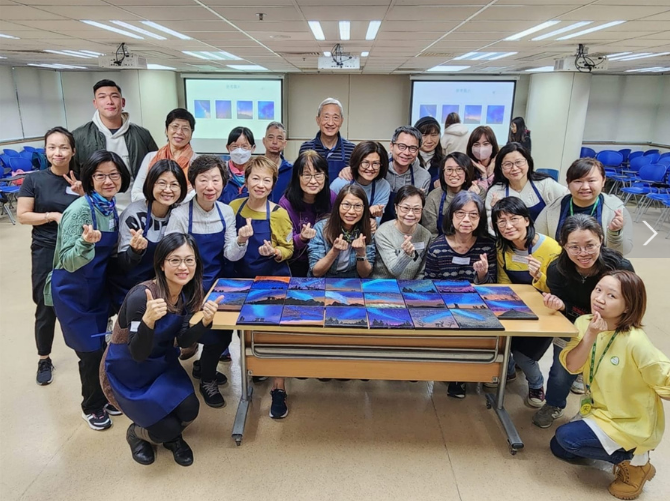Hong Kong has excellent retirement prospects
Tina Chan Yuk-ting defies the stereotypes about someone her age, with her gray hair the only visible clue she is 72 years old.
She stands without the slightest hint of a stoop, and speaks and moves in a lively manner.
Pushing a trolley stacked with paint cans, brushes, and a new handrail, she is on her way to do volunteer repair work for elderly residents living in public housing in Hong Kong’s Tsuen Wan district.
She was one of the three volunteers assigned to the project by Repairsgivers, an NGO dedicated to assisting the elderly, particularly those living alone, with home repairs.
Chan, a former healthcare assistant at the city’s Princess Margaret Hospital, learned to paint walls and install handrails last year, and volunteered for Repairsgivers.
Since retiring in 2003 at the relatively young age of 51, Chan has dedicated herself to two decades of volunteer work. This has included guiding a blind runner on a 5-kilometer run, visiting the elderly and taking them to hospital for treatment and helping them cut their hair.
While there is no official tally of volunteers in Hong Kong, the Agency for Volunteer Service provides a glimpse into the city’s robust volunteer culture. As of March 2023, the AVS had 8,352 registered volunteers, with approximately 11 percent, or 925 individuals, over the age of 65.
A study by the Hang Seng University of Hong Kong’s Department of Marketing in July, which was commissioned by the AVS, found that 8.9 percent of the city’s elderly have participated in volunteer work.
The survey also found that one in every two Hong Kong residents participated in some form of volunteerism.
The study further revealed that volunteers contributed 158 million hours in 2023, marking an 80 percent increase from 15 years earlier, and equating to economic output of HK$1.09 billion ($130 million).
Melissa Kaye Pang, chairwoman of the Hong Kong Agency for Volunteer Service, attributes the city’s enduring tradition of volunteerism to the joy it brings participants.
Chan is the epitome of this tradition. She said when she retired she didn’t expect to become a “full-time” volunteer, but is busy almost every day helping people across the city. Her phone’s step counter indicates she clocks up almost 10,000 steps a day.
She said volunteering keeps her occupied and leaves little time for any self-pity, despite living alone. Instead of idling away her time sitting in parks, Chan said she finds comfort in devoting time to helping other people.
Philip Wai Bo-wah, who recruited Chan as a volunteer, is a co-founder of Repairsgivers.
The NGO has over 100 volunteers on its list who provide repair services to elderly people living alone and those on Comprehensive Social Security Assistance subsidies. Volunteers like Chan are usually involved in two to three repair projects every week.
In 2023, Repairsgivers handled 526 cases, with 453 of them elderly people. This year, their goal is to complete 600 cases, with 80 percent of them households receiving the CSSA government subsidy.
For non-CSSA recipients, a nominal fee of HK$300 is charged to cover transportation and material costs, which is much cheaper than commercial prices for repair works.
Hong Kong Executive Councilor Lam Ching-choi, who also serves on the advisory panel on the silver economy, said the participation rate of Hong Kong’s elderly people in volunteer work is not low when compared with other developed regions, but, it has room to grow.
With the population continuing to age, silver volunteers can join volunteer work in a more organized and broader way, allowing their voices to be heard in society, Lam said.
Beyond the traditional roles of volunteers, Lam said many elderly volunteers with professional skills can offer assistance to grassroots people in areas such as financial management and medical advice.













